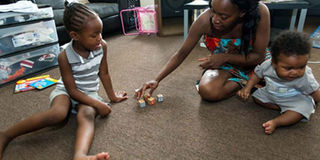Talking to your toddlers

Knowing how to communicate with your toddlers can help you bond with them better. COURTESY PHOTO.
What you need to know:
TALK. Toddlers are often talked about as if they are a species unto themselves. And when we are in the thick of it — the testing, mood swings and meltdowns (ours and theirs) — we may indeed feel in alien territory. Pauline Bangirana shares tips about how to talk to your toddler.
How do you talk to your child to make them feel comfortable with you around? Do you shout at them or do you just spank them so hard that they will cry until they are no tears rolling from them? As a parent, remember that the way you communicate with a child has an adverse effect on them when they grow up.
Shouting at the child will not change their behaviour but may rather cause insecurity on their part and make them live in fear of you because children do not understand when you are shouting at them.
Chebroi Moligi, a mother of five says, when communicating with her two-and-half-year-old son: “ I need him to feel like he can count on me as his friend when he grows up that is why I communicate with him as a friend.”
She explains that she does not come off as authoritative to her son but she knows that when he is wrong, the son will tell from her mood.
However, this is one in the millions of parents out there. So what happens to the parents who do not communicate appropriately to their children?
What some parents think
There are those who shout or even throw objects at their children because a child has failed to heed to advice or instructions. Is that the proper way a parent communicates with a child? What is the right way anyway? Some parents think that because they gave birth to the child, they can communicate and handle the child whichever way they please. However, this perception has changed over the years.
Talk normally
Olive Namukwaya, a journalist and mother of two says when communicating with her children, she just talks to them.
“I just talk to my children and when they do something wrong, I reprimand them. I do not beat them as such but I make an unhappy face at them and they will then know that they are in wrong,” says Namukwaya, adding: “At this point, the child will crawl away or smile at her or better still, admit his or her wrong.”
Scream
The mother of two further states she does not beat the child but if she is doing something scary maybe walking towards a charcoal stove, she will scream at the child.
“Screaming will scare her but after that, when she comes to me, I hug her and in a tough voice I tell her that what she was doing is bad,” she says.
However, she says most parents do this because at this time, one is scared that the child could get burnt and they act on instinct.
Christine Asiimwe, a nanny at the Nanny’s Nest Child Development Centre and day Care, notes that communicating with a child is not so difficult.
“When a child wants something, they will come and tap you and point at what they want or at times, they will cry. Other times, we can tell their needs according to the time of the day,” she notes. She further highlights that they have common words they use with the children to ease the communication between them and the children.
Speak like them
Above all, the nanny notes that for effective communication, they speak the way the children speak. This, she says, makes them communicate more often with them. Therefore, whichever way you communicate with that toddler in your home, assume for a moment that it’s you and treat them the way you would want to be treated but remember, do not be too tolerant as well, because you could end up misleading them.
As the saying goes, spare the rod and spoil the child but also note that too much of anything is always bad.
So let your communication be effective enough to yield a close relationship with your child but also make you feel proud of yourself as a parent.
Expert’s take
Reverend Dennis Odoi, a psychologist at Grace Assembly in Old Kampala notes that children are like dogs who do not speak, but if you do something repeatedly, they obey and give you their attention. He notes when you repeatedly tell a child something and reward them, a child will know what to do because children attach meaning to gestures like body language and noise they are repeatedly exposed to.
“Reward a child for what it has done and when giving a punishment, give them appropriate punishments like slight caning to stop them from doing the same thing. However, parents must avoid shouting at the child or abusing them because this causes emotional pain.” Reverend Odoi notes.
He highlights that verbal abuse hurts the child more than physical abuse since physical abuse can be easily forgotten. This also accounts for children becoming withdrawn or irritable and others are dull and restless. This is because they are wounded.




